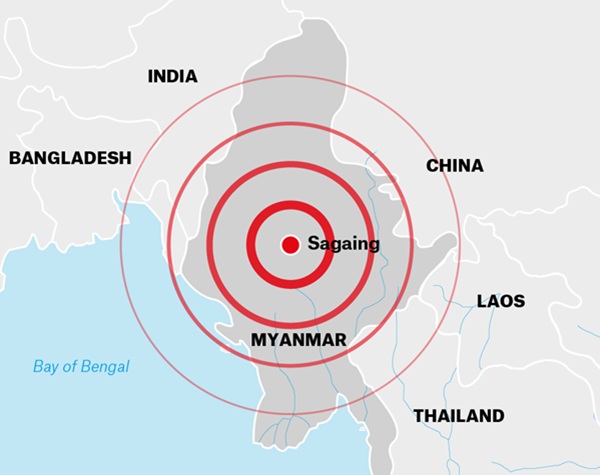 Myanmar earthquake map;
Credit: MSF
Myanmar earthquake map;
Credit: MSF
Handicap International Luxembourg, Médecins Sans Frontières (MSF) Luxembourg Team and UNICEF Luxembourg have issued statements following the 7.7 magnitude earthquake that struck central Myanmar on Friday 28 March 2025, killing over two thousand people and damaging many buildings and infrastructure.
The earthquake was also felt in Laos, Thailand and in China. The epicentre of the earthquake was located about ten kilometres from the city of Sagaing, in central Myanmar.
In a statement, Handicap International (HI) Luxembourg reported that the earthquake caused the collapse of several bridges, buildings and parts of the nearly 600-kilometre Yangon-Mandalay motorway, leading to road closures along the route. Authorities declared a state of emergency in six regions affected by the earthquake. The Burmese junta also appealed for international aid.
Kyaw Zaw Naing, head of HI's operations in Myanmar, said: " I fear the damage will be very significant in the worst-hit areas and I am thinking of the families and children there. I saw that bridges had been destroyed and some residents are afraid of possible flooding. The situation is still quite unclear at this stage, but we are doing everything we can to assess the needs."
Patrick Lefolcalvez, a technical rehabilitation expert for HI, based in Luxembourg, explained: "In these types of situations, our physiotherapists deploy quickly to conduct an initial assessment of the situation: available hospitals, status of rehabilitation services, etc. What is to be feared in the event of an earthquake is a high incidence of fractures, amputations and spinal cord or head injuries. My regional expert colleague will train the team online in emergency trauma care and inform all stakeholders on site that we are ready to intervene. We have the advantage of having teams on site for many years, particularly in the rehabilitation sector. In this context, we already have a small stock of mobility aids on site that can be deployed directly. Furthermore, we previously led a ‘Safe Hospital Initiative’ project, which aimed to prepare the Mandalay hospital, right next to the epicentre, for an earthquake-type disaster. A project supported from Luxembourg. The teams there are therefore prepared for prioritising care and providing emergency treatment. We will be able to contact them again as soon as possible."
MSF reported that its teams working in Myanmar and Thailand are safe, stating that humanitarian medical staff in Myanmar and neighbouring countries have the capacity to respond on a large scale to the needs of affected communities, provided the authorities facilitate rapid and unhindered access to allow teams to conduct assessments and provide medical care.
MSF added that, given the scale and intensity of the earthquake, the impact on populations could be devastating, particularly for cases requiring immediate life-saving assistance due to traumatic injuries. MSF also raised concerns about the people who will be vulnerable due to the loss of their homes, limited access to general healthcare and loss of access to clean water, which is crucial to controlling the possible spread of waterborne diseases.
MSF explained that the ability to deploy assessment teams and, ideally, surgical resources is essential in the first hours and days after an earthquake, in order to provide life-saving and limb-saving surgical care to the injured. Rapid access to affected areas and the rapid approval of essential supplies and personnel are crucial for an effective response.
MSF also stated that it does not yet have a precise assessment of its response to this specific emergency, but it is possible to donate to the emergency fund that helps respond to this type of disaster at https://msf.lu.
UNICEF called for urgent global action following the earthquake in Myanmar, stating that the full extent of the disaster is not yet fully known. The disaster left many families without shelter or access to essential services. As in any emergency, children are the most vulnerable and many have lost their homes, schools or even family members.
Catherine Russell, UNICEF Executive Director said: “This earthquake is another devastating blow to children in Myanmar—many were already living in a context of conflict, displacement and deprivation. In a matter of minutes, they lost loved ones, their homes and access to essential services. The needs are immense and growing.”
UNICEF added that, thanks to its long-standing presence in Myanmar, it was able to respond quickly and mobilise emergency assistance. As part of its initial response, the organisation is preparing to send 80 tonnes of life-saving supplies to children and families in distress. UNICEF teams are preparing to provide, among other things:
• Clean water and hygiene kits to prevent the spread of disease;
• Tents and tarpaulins to shelter homeless families;
• Medical and nutritional assistance to treat the injured and protect the most vulnerable children;
• Psychosocial support for traumatised children;
• Safe spaces for children separated from their families to protect them from violence and exploitation.
The agency stated that, even before the earthquake, Myanmar was one of the most complex humanitarian situations in the world. More than 6.5 million children were already in need of assistance. UNICEF has been working in the country for over 70 years, with programmes in health, nutrition, education, water and child protection.
Donations can be made via: https://www.unicef.lu/myanmar_en/?_adin=132415900








